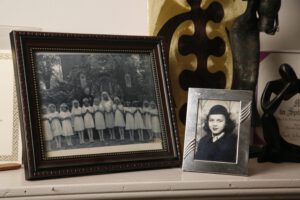
Mike Lattimore felt a mix of anxiety and dread about visiting Africa, so fraught it was with the scars of slavery.
But standing on the shores of what is known as the “Slave River” near the Cape Coast of Ghana, where men and women were once bathed before they were sold into slavery, Mike felt a sense of peace instead of horror.
“We had a ritual,” he said.
In his journey to explore his ancestry, Mike, a 57-year-old who lectures on cyber security, turned to 23andMe’s genetic testing to guide the way.
Using 23andMe’s ancestry tools, Mike learned more about his mixed heritage rooted in both Africa and Russia. The information has filled in big gaps in his family history and helped Mike add more pages to what he likes to call “The One Story” tracing back the lives of his ancestors.
“23and me pointed me in the right direction in terms of knowing which records to sift through, which direction to go,” he said.
Standing there with other African Americans, Mike felt he was answering the prayers of his ancestors, a plea that their children and children’s children would be better off than they were. He saw evidence of that answered prayer in his own life – his family, his job and the things he’d achieved–and in the fact that he was able to return to tell the story of what had happened there.

A photo of Mike’s mother in front of some art from Africa.
“It was a powerful and healing experience,” he said. “Good indeed did come out of that story. Light came out of the darkness of what happened there.”
His results from 23andMe didn’t just point him to Africa, but to his European ancestry and it reminded him of the interconnections of all people.
With his results he knew that his ancestors were likely from West Africa, but here was more than the science pointing him in that direction. When he walked among the Fante people he was overcome with a strong sense of kinship. They had the same orientation toward the water and fishing his own family had.
“I was struck by the people, there was something about the music and the energy it just felt right,” he said.
He knows that his E1a haplogroup points to ancestry in West Africa, but beyond the test results, Mike felt something deeper. He felt he was one of them.
The journey back to Africa capped a more than ten-year quest to discovery his ancestry, a hunt that included finding birth and death certificates in a rural town in Kentucky, contacts in Newfoundland and a convent in Baltimore.
The results from 23andMe also linked him to his mixed ancestry, one that is rooted in Africa, but includes both Jewish and, surprisingly to him, Scandinavian ancestry.
“My ancestors came from disparate places on the planet but all have lived the story of the struggle to seek a better life,” Mike said. “When I think about it, it gives me goose bumps because I am the sum total of all that they were, and now, I am the keeper of the memory.”
Some of that history Mike had heard from his own father. He heard about his great grandfather, Rush Green, who’d been owned by a man named Miller. Upon gaining his freedom his grandfather took the name “Green,” because he liked it.
“He told Papa, ‘a man has got the right to name his-self.’”
In his chronicling of his “One Story,” Mike has found his great grandfather’s grave in Paducah Kentucky, an “Aunt Minnie,” born in Russia whose native language was Yiddish, and records of his mother’s life being raised by the Oblate Sisters of Providence, an order of black Catholic nuns in Baltimore. He found records of his grandmother, Mary Brace, a white Canadian woman who had to give up his mother for adoption.
Through 23andMe he’s found relatives he didn’t know he had and he continues to fill in more pages of his family history.
“I strongly feel that we should invest in finding our ancestry because it really helps us as human beings not only to have a legacy that we can pass down but also to help with the healing,” Mike said. “Our country has experienced a great rift in that we have never fully investigated what happened. You’ve got to know where you’ve been so that you know where you’re going.”
23andMe provides genetic testing services for informational purposes; your results may or may not help you to search for or identify relatives or family members.



